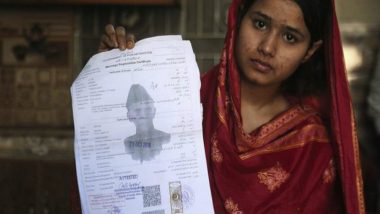Gujranwala, May 7: Muqadas Ashraf was just 16 when her parents married her off to a Chinese man who had come to Pakistan looking for a bride. Less than five months later, Muqadas is back in her home country, pregnant and seeking a divorce from a husband she says was abusive.
She is one of hundreds of poor Christian girls who have been trafficked to China in a market for brides that has swiftly grown in Pakistan since late last year, activists say.
Brokers are aggressively seeking out girls for Chinese men, sometimes even cruising outside churches to ask for potential brides. They are being helped by Christian clerics paid to target impoverished parents in their congregation with promises of wealth in exchange for their daughters. Pakistan: Two Hindu Teenage Girls Abducted And Forcibly Converted to Islam on Eve of Holi; Sushma Swaraj Seeks Details From Indian Embassy.
Parents receive several thousand dollars and are told that their new sons-in-law are wealthy Christian converts. The grooms turn out to be neither, according to several brides, their parents, an activist, pastors and government officials, all of whom spoke to The Associated Press.
Once in China, the girls - most often married against their will - can find themselves isolated in remote rural regions, vulnerable to abuse, unable to communicate and reliant on a translation app even for a glass of water.
"This is human smuggling," said Ijaz Alam Augustine, the human rights and minorities minister in Pakistan's Punjab province, in an interview with the AP.
"Greed is really responsible for these marriages ... I have met with some of these girls and they are very poor."
Augustine accused the Chinese government and its embassy in Pakistan of turning a blind eye to the practice by unquestioningly issuing visas and documents. The Chinese Ministry of Foreign Affairs denied that, saying China has zero tolerance for illegal transnational marriage agencies.
Human Rights Watch called on China and Pakistan to take action to end bride trafficking, warning in an April 26 statement of "increasing evidence that Pakistani women and girls are at risk of sexual slavery in China."
On Monday, Pakistan's Federal Investigation Agency arrested eight Chinese nationals and four Pakistanis in raids in Punjab province in connection with trafficking, Geo TV reported. It said the raids followed an undercover operation that included attending an arranged marriage.
The Chinese embassy said last month that China is cooperating with Pakistan to crack down on unlawful matchmaking centers, saying "both Chinese and Pakistani youths are victims of these illegal agents."
The Associated Press interviewed more than a dozen Christian Pakistani brides and would-be brides who fled before exchanging vows. All had similar accounts of a process involving brokers and members of the clergy, including describing houses where they were taken to see potential husbands and spend their wedding nights in Islamabad, the country's capital, and Lahore, the capital of Punjab province.
"It is all fraud and cheating. All the promises they make are fake," said Muqadas.
In China, demand for foreign brides has mounted, a legacy of the one-child policy that skewed the country's gender balance toward males. Brides initially came largely from Vietnam, Laos and North Korea.
Now men are looking further afield, said Mimi Vu, director of advocacy at Pacific Links, which helps trafficked Vietnamese women.
"It's purely supply and demand," she said. "It used to be, 'Is she light-skinned?' Now it's like, 'Is she female?'" Pakistan seems to have come onto marriage brokers' radar late last year.
Saleem Iqbal, a Christian activist, said he first began to see significant numbers of marriage to Chinese men in October. Since then, an estimated 750 to 1,000 girls have been married off, he said.
Pakistan's small Christian community, centered in Punjab province, makes a vulnerable target. Numbering some 2.5 million in the country's overwhelmingly Muslim population of 200 million, Christians are among Pakistan's most deeply impoverished. They also have little political or social support.
Among all faiths in Pakistan, parents often decide a daughter's marriage partner. The deeply patriarchal society sees girls as less desirable than boys and as a burden because the bride's family must pay a dowry and the cost of the wedding when they marry. A new bride is often mistreated by her husband and in-laws if her dowry is considered inadequate. By contrast, potential Chinese grooms offer parents money and pay all wedding expenses.
Some of the grooms are from among the tens of thousands of Chinese in Pakistan working on infrastructure projects under Beijing's Belt and Road Initiative, a project that has further boosted ties between the two countries in recent years.
Other grooms search directly from China through networks. They present themselves as Christian converts, but pastors complicit in the deals don't ask for any documentation.
They pay on average USD 3,500 to USD 5,000, including payments to parents, pastors and a broker, said Iqbal, who is also a journalist with a small Christian station, Isaac TV. Iqbal has gone to court to stop marriages and sheltered runaway brides, some as young as 13.
Muqadas' mother Nasreen said she was promised about $5,000, which included the cost of the wedding and her daughter's wedding dress. "But I have not seen anything yet," she said.
"I really believed I was giving her a chance at a better life and also a better life for us," Nasreen said.
Dozens of priests are paid by brokers to find brides for Chinese men, said Augustine, the provincial minorities minister, who is Christian. Many are from the small evangelical churches that have proliferated in Pakistan.













 Quickly
Quickly




















